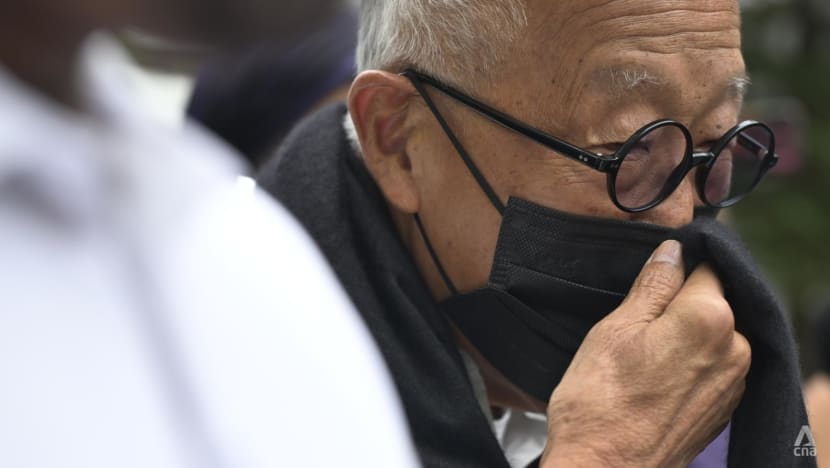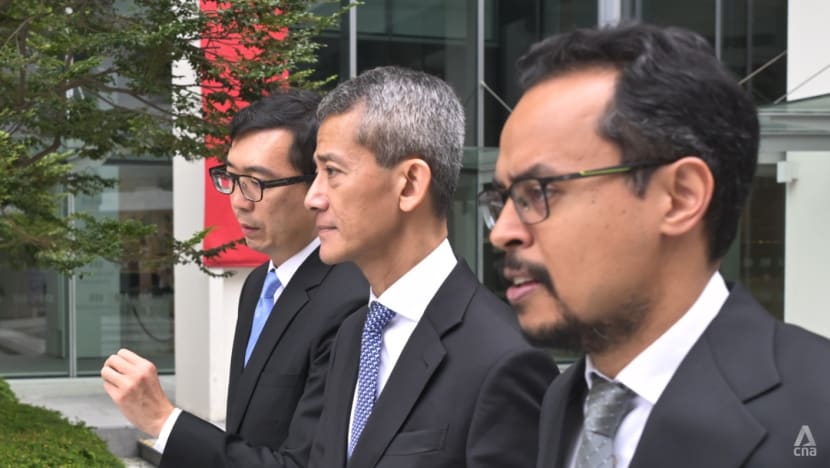CNA Explains: Judicial mercy – what is this 'very rarely' invoked power of the courts?
CNA's court journalists take a closer look at the concept that was brought up in the case of cancer-stricken tycoon Ong Beng Seng.

Ong Beng Seng leaving the State Courts after pleading guilty on Aug 4, 2025. (Photo: CNA/Wallace Woon)

This audio is generated by an AI tool.
SINGAPORE: Property tycoon Ong Beng Seng pleaded guilty on Monday (Aug 4) to a charge of abetting former Transport Minister S Iswaran in obstructing justice.
A second charge for instigating Mr Iswaran to obtain flights and a hotel stay from Ong will be taken into consideration during sentencing, which was adjourned to Aug 15.
Both the prosecution and defence called for the court to exercise judicial mercy and impose only a fine, in light of what Ong's lawyer described as "a devastating cocktail of medical problems".
What is judicial mercy?
It's an extraordinary measure in which the sentence of an accused person is reduced on humanitarian grounds, criminal lawyer Adrian Wee of Lighthouse Law said.
He said that factors considered by the court in applying judicial mercy include the severity of the crime and others such as the risk of re-offending.
“Ultimately it is a balancing exercise between the need to punish offenders and putting an individual, for example, one who is gravely ill, at risk,” said Mr Wee.
Ms Joyce Khoo from Quahe Woo & Palmer described judicial mercy as the tempering of punishment imposed, in light of the offender's personal circumstances.
"The court would take into account the offender's exceptional circumstances and ameliorate the punishment imposed to reflect the court's and society's humanity towards the offender's plight," she said.
Mr Sanjiv Vaswani of Vaswani Law Chambers meanwhile defined it as the power that the courts have to impose a lenient sentence in light of exceptional mitigating circumstances.
In exercising judicial mercy, the court "effectively displaces the culpability of the offender as a central consideration, with considerations of humanity", he added.
In Ong’s case, the court heard how cancer had damaged his skeletal system and severely compromised his immune system, making him vulnerable to life-threatening infections. He also suffers from complications which could exacerbate his risk of infection and gangrene.
His lawyer Cavinder Bull said Ong’s risk of infection would increase in prison due to the movement of people, in turn increasing his risk of death. In contrast, Ong’s home environment is more controlled, and he has access to medical personnel who have been treating him for years.
How does it differ from a mitigating factor?
Ms Khoo said the court considers whether judicial mercy ought to be exercised only after considering all mitigating factors and arriving at a sentence.
If exercised, the eventual sentence would be lowered to reflect the court's sympathy to the offender.
"When exercising judicial mercy, the court is not so concerned with the eventual sentence being proportional to the offending behaviour," she said.
"This is considered at the mitigation stage. In exercising judicial mercy, the court is concerned about alleviating the effects of imprisonment on the basis that it is the humane thing to do given a specific circumstance."
Lawyer Chooi Jing Yen, who runs his own eponymous law firm, said everyone is entitled to raise mitigating factors when they plead guilty to an offence, but not everyone is entitled to judicial mercy.
"If successfully raised, the sentence will be substantially outside the norm, and generally cannot be relied on as a precedent for other cases,” he said.
Veteran criminal lawyer Ramesh Tiwary said judicial mercy was "more than merely mitigatory because it shifts the focus of the sentence to account for the illness", rather than being punitive.
Lawyer Mark Yeo from Fortress Law said the purpose of citing ill-health as a mitigating factor would be to persuade the court that a longer term of imprisonment would have a disproportional impact on an offender, compared with someone without the same medical condition.
A reduction in sentencing with ill health as a mitigating factor would not be as significant compared to if judicial mercy was exercised, he said.

Why still prosecute if judicial mercy will be exercised?
While it is solely up to the prosecution to decide who to prosecute and what for, lawyers offered some insight.
Ms Khoo said that convicting an offender shows that they are guilty of an offence. Just because judicial mercy is eventually exercised does not mean that the offender is not guilty or not liable.
Mr Chooi pointed to the possibility of a "signalling effect" in the form of a message of deterrence still being sent to the general public.
He also noted that if a court exercises judicial mercy, it cannot step outside legislative bounds or where sentences are fixed.
This means that if an offence has a mandatory minimum jail term, or has to be punishable by death - such as in capital offences involving murder and drug trafficking - then that is the sentence that must be meted out.
In Ong's case, the offence of abetting obstruction of justice carries a jail term of up to seven years, a fine, or both.
While both the prosecution and defence have called for judicial mercy to be exercised here, the court has the discretion to decide if it chooses to do so.
How often is judicial mercy invoked?
Lawyers all told CNA the exercise of judicial mercy was “very rarely” applicable in Singapore.
Mr Tiwary said: "The accused must have a terminal illness or an illness which would be life-threatening in a prison environment."
Mr Chooi said the threshold for invoking it was "extremely high" and would take very exceptional cases, by and large on the grounds of ill health.
In 2018, a man's jail term of three weeks was reduced to a S$250 (US$194) fine on account of his terminal cancer.
Lim Kah Heng, 68, had pleaded guilty to a charge of corruption. He was diagnosed with acute myeloid leukaemia shortly after he was sentenced.
On appeal, the prosecution did not object to Lim's application for judicial mercy.
A High Court Judge said he accepted that grounds existed for judicial mercy. He noted that corruption was a serious offence, and imposed a fine.
In 2008, retail tycoon Tang Wee Sung was sentenced to one day's jail and fined S$17,000 after he tried to buy a kidney and lied about it. One of the two charges he pleaded guilty to had mandatory imprisonment.
Tang suffered from end-stage renal disease among other medical conditions, and was granted judicial mercy by the court.
Tang's case was raised by Mr Bull during mitigation, with the defence counsel noting that Tang received only one day of jail as a jail term was mandatory.
According to a past judgment on Tang’s case, the court said the sentence imposed would “reduce the risk of aggravation of Tang’s extreme ill health.”



















